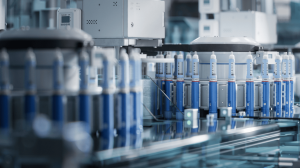Introducing baby to the right bacteria
Breast milk could cut cases of deadly GI inflammation in premature infants
Developing a symbiotic relationship with the right bacteria is essential for a baby’s health and development. W. Allan Walker, a researcher at Harvard Medical School and Massachusetts General Hospital, has been leading research into the complex relationship among the newborn gastrointestinal system, its bacterial immigrants, and the way breast milk helps regulate the process. Walker and his colleagues propose that the intestines of premature babies are unprepared for interaction with the external environment, which can lead to one of the most serious diseases in premature infants, necrotizing enterocolitis. But babies do have a natural source of aid in making a transition between such radically different environments as those inside and outside the womb. “Nursing is like an extension of the umbilical cord,” Walker said. Not only does breast milk provide nutrition, but research is uncovering more and more factors in it that speed the development process. For instance, breast milk contains hormones and growth factors that help the intestines mature and factors that boost the immune system, as well as specific antibodies to pathogens in the mother’s — and hence the baby’s — environment.





